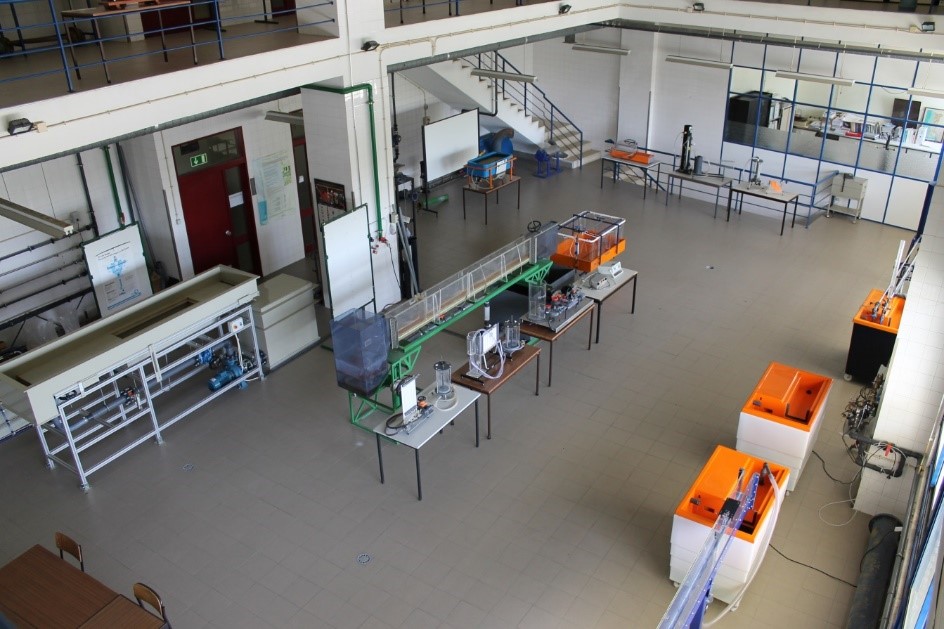DCEA has several laboratories to support learning and research, with equipment and infrastructure that support multiple areas: Chemical Analysis; Computers; Ecology and Biology; Ecotoxicology; Air quality; Hydraulics; Spatial Planning and Environmental Planning; Soils and Soil Pollution; Remediation; Water, Wastewater and Waste Treatment. The laboratories welcome students and young researchers interested in developing research, namely under their master thesis.
| MARlab - Marine Environmental Risk Assessment and Research Laboratory - brings together researchers from MARE-NOVA research center to develop basic and applied research in Ecology, Environmental Toxicology and Risk Assessment. MARlab has 4 lines of research: Ecotoxicology and Risk Assessment, Biosedimentary Dynamics of Coastal Areas, Marine Waste and Microplastics, Bioremediation of Aquatic Sediments. MARlab includes a cell culture room; facilities certified by the General Veterinary Directorate for carrying out bioassays with marine organisms, including 4 stables and reproduction rooms; two laboratories equipped for research in Marine Biology and Toxicology. | |
|
|
|
|
| O RESOLUTION LAB is a research-oriented infrastructure, created by researchers from CENSE and LAQV. Specialized and value-added analytical knowledge, cutting-edge instrumentation and methodologies are carried on in the Lab for research projects and work under partnerships with external academic institutions and industry. Research focuses on the effects of chemical elements and compounds on nature - air, water, soil, food, food chains, biome, chemical ecology, environmental remediation, waste recovery and recovery of critical raw materials. It uses chromatography for the study and development of new analytical approaches and optimization of methods; promotes the transfer to the end user of analytical methods for qualitative and quantitative characterization of complex environmental, biological and food matrices, chemical ecology and problem solving in the environment. |
|
|
|

|
| The Hydraulics Laboratory Armando Lencastre, opened on October 16, 1996, provides support for teaching hydraulics, hydrology and water resources management, as well as for research activities. The Laboratory is adequately equipped for the development of tests and practical work and has several equipment for carrying out field work. This Laboratory includes the estate donated by Prof. Lencastre to FCT-NOVA, which belonged to the former Armando Lencastre Foundation. |
|
|
The Water Quality and Treatment Laboratory is the CENSE research laboratory of the Sustainable Water Sanitation, Wastes and Resources Recovery area, where research is carried out on projects, significantly supported by companies working in the urban water cycle sector. This laboratory, in conjunction with teaching laboratories associated with aspects of water quality and the treatment of water supply and wastewater, allows students to experiment applied learning aimed at solving problems that arise in general in the areas of environment and particularly in sanitary engineering field. These laboratories, besides the standard equipment of any laboratory, has gas chromatography equipment, liquid chromatography, TOC, Jar Test equipment, culture chambers. It should be highlighted the existence of a series of demonstrating operations and processes pilots for the treatment of water, wastewater, namely: water treatment (coagulation, flocculation, lamellar sedimentation); filtration, fast and slow mixing; aeration; reactors in series and of reactors in parallel; wastewater treatment (activated sludge); rotating biological contactors; anaerobic digestion; ultrafiltration unit; sludge thickening unit. |
|
|
The Waste@Nova Laboratory is the MARE research laboratory of waste subject, where research is carried out on projects supported by industry faced with the challenges of the circular economy and the transformation of waste into environmentally friendly products. This laboratory, in conjunction with the teaching laboratories associated with the waste subject, provides students with applied learning aimed at solving problems that arise in the areas of environmental engineering in general and sanitary engineering in particular. These laboratories are equipped for the physical-chemical characterization of urban waste and compost (resulting from the composting process), the assessment of the biodegradability of materials under composting conditions according to Standard EN 13432-2000 (dedicated to packaging), disintegration and phytotoxicity tests. The Waste@Nova Laboratory has a laboratory composting pilot and also a demonstration scale composting facility that support research in this subject. |